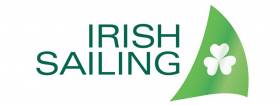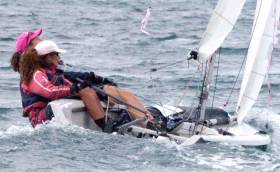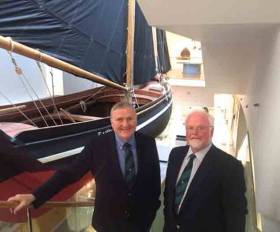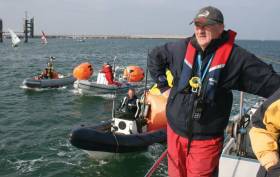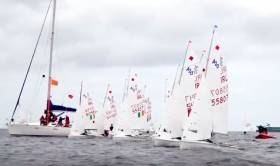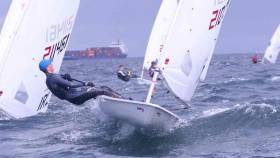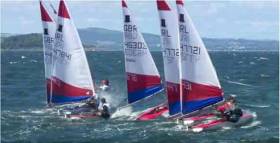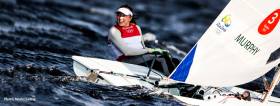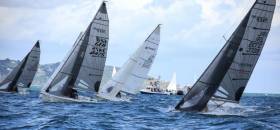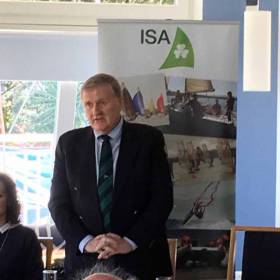Displaying items by tag: ISA
So Long, ISA - Hello, Irish Sailing
#IrishSailing - The Irish Sailing Association is now known as Irish Sailing.
The branding refresh comes on the foot of member feedback to Ireland’s national governing body for sailing, powerboating and windsurfing – and is intended to underline changes within the organisation as part of its five-year strategic plan.
The name change also echoes the ISAF’s switch to World Sailing in late 2015.
“Irish Sailing is more modern and welcoming, immediately understood by non-sailors and international audiences alike, and more appealing to those who might like to try our sports,” said the organisation in a statement.
As of yesterday (Monday 26 June), the new Irish Sailing logo appears on its website and social media feeds, and will gradually be rolled out across official documents, printed materials and products over the coming months.
ISA Want More Women Involved in Sailing
One of Jack Roy’s priorities for his presidency of the Irish Sailing Association (ISA) is to get more women involved in sailing.
As he wrote for Afloat.ie in April, the ISA wants to encourage greater female participation via a two-pronged approach.
That means both in the activity of sailing itself, via the Women on the Water programme, and through improving the gender balance in ISA governance.
Women on the Water — a network of Irish-based female sailors, windsurfers and powerboaters — was formed with the aim of raising not only the number of women getting afloat, but also their profile and level of skill.
And its continued success is now supported by the appointment of two more women to the ISA Board this year.
Fiona Bolger and Nikki Curran join Sarah Byrne, who has served on the board since 2015.
Byrne, an RS sailor from Greystones Sailing Club, is deeply involved in the Competition & Classes policy groups, no doubt ensuring the perspective of women in sailing is taken into account.
Her new board colleagues, who joined this past March, bring their own sailing pedigree.
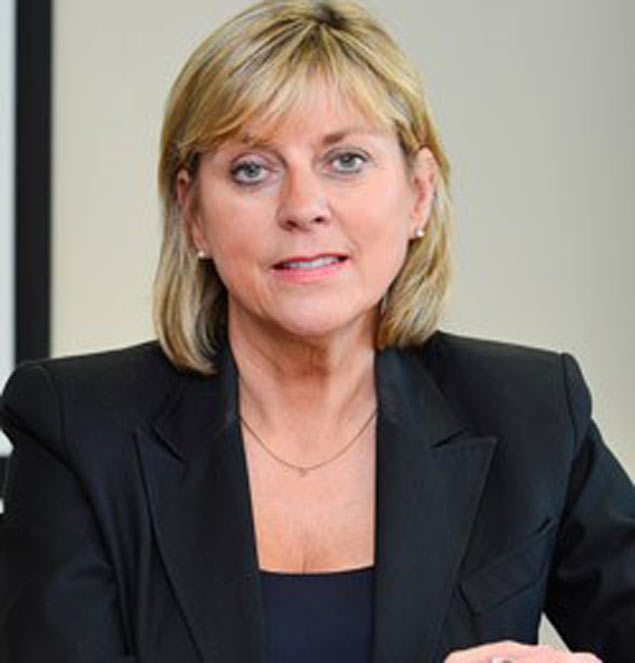 Fiona Bolger has joined the board of the Irish Sailing Association
Fiona Bolger has joined the board of the Irish Sailing Association
Fiona Bolger, a communications and PR guru, has a number of national and international events under her belt representing Baltimore Sailing Club in the competitive hotbed of West Cork.
As chief executive of Spinal Injuries Ireland, she has also been instrumental in organising the new Watersports Inclusion Games that are taking place in Dun Laoghaire.
Meanwhile, Nikki Curran will contribute to the Clubs & Participation policy group after many years heavily involved in junior sailing at Sligo Yacht Club, giving her a unique insight into what sailors wants from their clubs and their ISA.
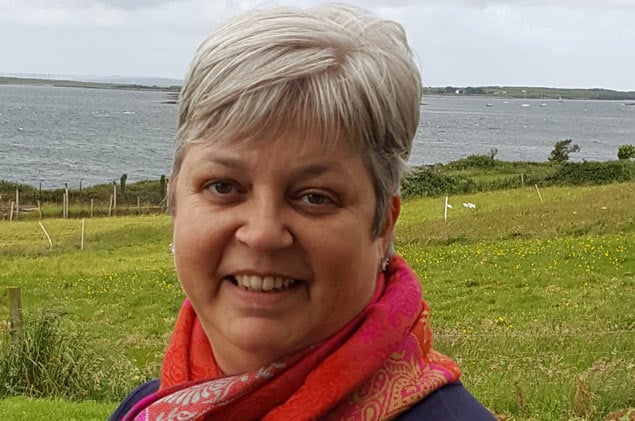 ISA Board Member Nikki Curran of Sligo Yacht Club
ISA Board Member Nikki Curran of Sligo Yacht Club
The presence of Curran, Bolger and Byrne brings female membership of the 11–seat ISA board to more than a quarter – confirmation that Roy is making good on his promises to steer the ISA to an inspiring new heading.
But it should also be clear that these are no mere token appointments, as all three bring to bear a wealth of experience both within and beyond sailing to promote a more inclusive sport for all.
Jack Roy may have become the new Irish Sailing Association President for a three year term as recently as the end of March writes W M Nixon. But having spent a few weeks re-appraising the functioning of the ISA as seen from a Presidential viewpoint (for he had been a Board Member), he has been energetically implementing his policy of representing the ISA whenever possible at gatherings large and small throughout the country.
It works two ways, as it puts a human face on the national authority, and at the same time he can take on board local opinions on everything to do with the Association’s work. This past week has seen him at the award to Wicklow Sailing Club of the Mitsubishi Motors “Sailing Club of the Year 2017” accolade on Tuesday, then on Thursday he was fulfilling a double bill in his first official visit to Galway, following which on Saturday afternoon he was in his familiar race officering duties for Dublin Bay Sailing Club in decidedly contrary race organising conditions, and then on Saturday night he and his wife Rosemary (who is also a member of his race organising team) were at the Golden Jubilee Dinner in the National Yacht Club to celebrate Carmel Winkelmann’s key role in setting up the NYC’s Junior Section fifty years ago in 1967, a pioneering move in developing the Junior Sailing Programme for what was then the Irish Yachting Association.
The visit to Galway – with Galway’s own Pierce Purcell setting the guidance pace - he found to be uniquely interesting, as it gave a fresh insight into how the western city sees itself in its special relationship with the sea, which has a long and distinguished history dating back to the time it used to be one of the most significant ports in Europe.
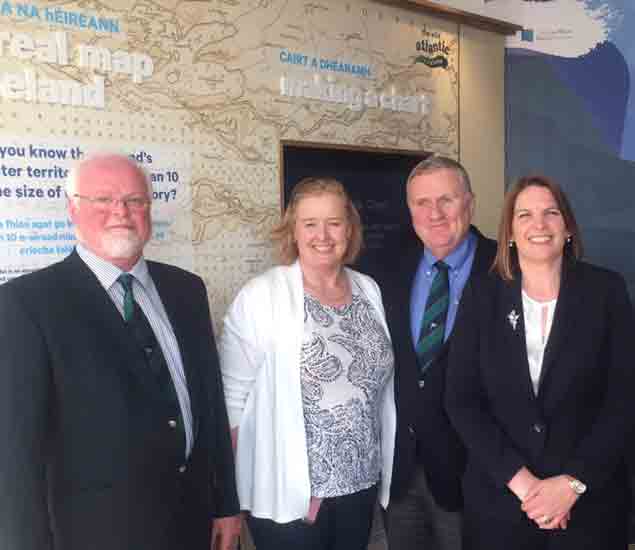 At the opening of the Marine Institute’s Marine Science Exhibition in Galway City Museum were (left to right) Pierce Purcell, Helen McCormack of the MI, Jack Roy (President Irish Sailing Association) and Caroline Bocquel, Director of Corporate Services, Marine Institute
At the opening of the Marine Institute’s Marine Science Exhibition in Galway City Museum were (left to right) Pierce Purcell, Helen McCormack of the MI, Jack Roy (President Irish Sailing Association) and Caroline Bocquel, Director of Corporate Services, Marine Institute
This is going to be celebrated with the popular Seafest in the western capital from July 30th to 2nd June, and it all came together in Galway City Museum on Thursday, with the Seafest details announcement, and the the Marine Institute launching its Marine Science Exhibition, which is on the top floor of the Museum with the bonus of superb views over the ancient Claddagh - Galway’s original port - and across Galway Bay to the Clare hills.
Up there, with intriguing exhibits and displays giving a sense of the past and thoughtful visions of future development and discovery, the special Galway buzz from the city and harbour below is palpable, and the entire experience comes with the most enthusiastic Presidential recommendation.
New ISA President Jack Roy Sets Out His Priorities
I am very honoured to be elected as the new President of the Irish Sailing Association – a post which brings with it the need for vision and rigour as well as the potential for ongoing improvement.
The first ISA President was elected in 1945. Over the past 72 years, we have grown to become the national governing body for sailing, powerboating and windsurfing and, along with clubs, classes and training centres, we are committed to developing the interests of our sport at all levels, from day trips to ocean voyages, recreation to cruising, dinghies to keelboats and all those who enjoy activity on the water, be they young or old, beginners to Olympians.
The main aim during my tenure is to highlight the relevance of the ISA to our membership as well as increasing the number of people sailing and becoming members of the organisation. It is vital to stress that it is only through the work of the ISA that freedom on the water is retained, that training at all levels is of the best quality, queries are answered knowledgeably, and racing standards are maintained and recognised internationally.
My term begins in the aftermath of a harsh recession, but there is cause for optimism. Our 2020 strategic plan is being implemented well; ISA membership is increasing; we had a wonderful Olympic success last year; and the economic outlook in many parts of the country is improving. The ISA has a solid and positive plan for the future, but I would like to set out my own key priorities as President:
- To better understand the demographics and culture of the ISA’s membership and build a fuller picture of our sport and community. This, combined with a more robust set of statistics, means we can create and share a story of who we are to all stakeholders
- Our new ISA Club Coaching Programme is rolling out in clubs this year and aims to fill a gap between our core training and the ISA Performance Pathway. The advantages are threefold: a) to convert “summer-course-only” sailors into those who take part in club activity all year round, b) to broaden the talent pool of potential Performance Pathway sailors, c) to expand the circle of club coaches. We will take Olympic expertise from the Pathway programme and use it to develop a stronger coaching culture in clubs
- The “Try Sailing” campaign has run successfully since 2015. Last year, over 3,500 people took part, but now we’d like to focus on how “Try Sailors” convert to club members. The first signs are promising, (almost 50% of clubs who undertook a Try Sailing event in 2016 saw a rise in membership), but how can we ensure that an end-to-end approach is taken, and that we understand and share all the necessary steps to get life-long participants?
Alongside these three priorities, the ISA will continue to develop and support, among others, two specific groups. Third level students are an active group, and we want them to continue sailing after graduation. We will also encourage the participation of women in sailing – through both ISA governance and our “Women on the Water” programme.
Together with the dedicated and professional team at the ISA, our policy group volunteers and our hard working Board, I believe we can create real change, inspire newcomers, and make our sport one that is truly a sport for all, and a sport for life.
I welcome all feedback and I’m happy to discuss issues at all levels. I can be contacted at [email protected]
ISA Youth Sailing Video from Ballyholme YC Here
Ballyholme Yacht Club has released a video of all the weekend action from Bangor Bay, the largest entry ever for the ISA youth national championships.
Read our full report here and see the latest video moments below:
Day Two of the ISA Youth Sailing Pathway National Championships and Optimist Trials saw all of the fleets afloat for the first time with over 200 sailors visiting Ballyholme Yacht Club.
With a stronger breeze than yesterday averaging 12-14 knots but peaking just over 20 knots, fitness and stamina were important especially in the Laser Radial fleet where Ewan McMahon and Johnny Durcan showed the form expected with Ewan winning the first 2 races and Johnny the latter. The Radial fleet were a bit excitable in the first race of the day with 3 general recalls and Johnny earned himself a BFD dropping him to third overall. Henry Higgins splits the two of them overall. Sally Bell continues to lead the ladies although she copied Johnny's BFD in the first.
There was lots of tight racing in the 420 class with little separating the first few at the finishes. Wexford Harbour's duo of Geoff Power and James McCann however managed to escape at the end of each race with three bullets for the day, and now leads overall.
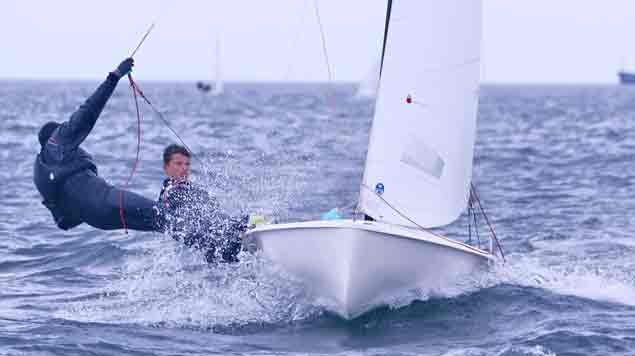 420 leaders Geoff Power James McCann from Waterford Harbour Sailing Club Photo: Simon McIlwaine
420 leaders Geoff Power James McCann from Waterford Harbour Sailing Club Photo: Simon McIlwaine
The Optimist fleet had four races today which tested all of the youngsters especially with a squall at the start of the last race with all but only a few getting too tired in the testing conditions to finish the last race.
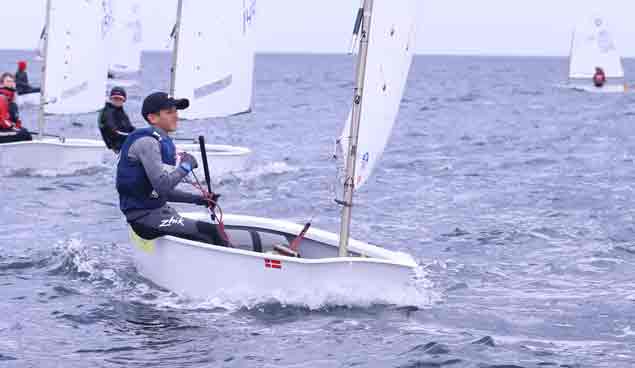 Optimist sailor Justin Lucas. Photo: Simon McIlwaine Photo: Simon McIlwaine
Optimist sailor Justin Lucas. Photo: Simon McIlwaine Photo: Simon McIlwaine
The Laser 4.7 fleet started their racing today with Sally Bell's younger brother Harry from Royal North Ireland winning the first race. Jack Fahy won the second race and Clare Gorman the last but the most consistent and now leads overall with a 4,2,1
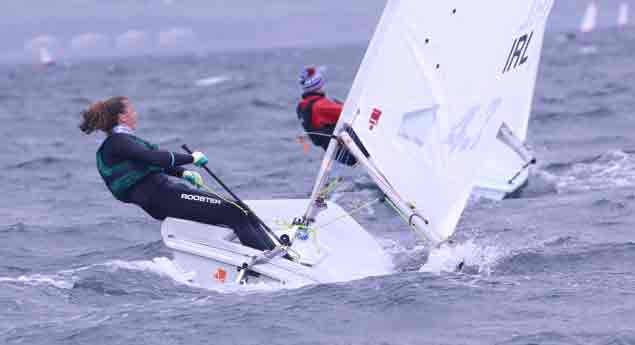 Clare Gorman of the National Yacht Club leads the Laser 4.7s Photo: Simon McIlwaine
Clare Gorman of the National Yacht Club leads the Laser 4.7s Photo: Simon McIlwaine
Another family affair, Jack Fahy's sister Kate showed great form in the Topper fleet which was also racing for their first day lying second overall from East Down's Sarah Jennings. Rob Keal won the first two races however and leads overall with 1,1,4. The Topper 4.2 fleet saw a local fight between Lewis Thompson, Hannah Dadley-Young and Josh McGregor with Lewis also getting 3 bullets for the day.
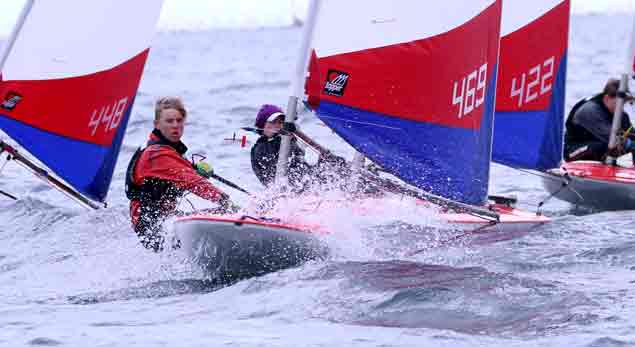 Rob Keal of Royal Cork is the Topper leader Photo: Simon McIlwaine
Rob Keal of Royal Cork is the Topper leader Photo: Simon McIlwaine
Full results are here. Optimist trials results may be found here.
In the evening, Rio Olympic Silver medallist Annalise Murphy gave the young audience some great reflections of her journey from the Optimist Trials through the various Pathway Championships in her Laser Radial and what it took to medal in Rio after the disappointments of London. There were lots of tidbits for the competitors to remember and Annalise revealed the level of commitment required with some of the extracts from her training diary started at the age of 13.
Day 3 of the racing starts tomorrow at 11:00 for all classes. The Championships finish on Sunday.
With four days of an intensive programme getting under way tomorrow (Thursday) on three different course areas off Ballyholme Bay on Belfast Lough, the ISA Youth Sailing Nationals is making a spectacular debut in Northern Ireland writes W M Nixon.
The north in general, and Ballyholme in particular, have produced so many talented sailors that it seems surprising this is the first time the vibrant Ballyholme club, or indeed any club north of the border, has hosted the Youth Nationals in their contemporary guise.
But last summer’s successful Topper Worlds 2016 on Belfast Lough, and before that the F18 Worlds, have clearly shown that Ballyholme’s strong dinghy participation emphasis can confidently transfer itself into superb race management. And they’re certainly pulling out all the stops to deal with a total fleet numbers which should top the 250 mark by the time entries are finalised tomorrow tonight.
Yet even with entries finalised, it’s keeping pace with the new names in the rapid turnover of super-sailors in the junior divisions which test any analysis system. When you’ve a situation where you’re no longer a Youth Sailor after the age of 19, things happen very quickly. And though they’ll allow you to race a Topper at any old age you like (and some do), you’re only in the racing game if you’re under 16, while Optimists draw the serious line at 15, and all classes have further age sub-divisions.
Still and all, we’ll be looking forward to a real ding-dong in the Lasers between Johnny Durcan of Cork and Ewan MacMahon of Howth, who were first and second in last weekend’s 125-boat Munster Laser Championship at Baltimore. Let battle commence.
The ISA add:
Starting tomorrow Ireland’s largest Youth Sailing regatta is the ISA’s primary talent spotting event. The first time the event is being held at Ballyholme Yacht Club and it has over 200 sailors registered – the largest entry ever.
Racing will be held over three race courses and five classes. Organsiers say there will be great racing on the water and good fun at the club ashore.
Evening talks as well as the races are open to all young sailors who sail in the five ISA Youth Pathway Classes (Laser Radial, Laser 4.7, 420, Topper, Optimist).
The ISA squad programmes will resume this summer in the Laser 4.7 and Topper classes, and these classes will have a squad trial to identify future ISA Pathway sailors. In addition, ISA spotters are out to assess sailors for Academy trials for the Laser Radials and 420s. (The Optimists will have separate Class-organised talent spotters).
Eight places on the ISA Topper Squad : In the Topper class up to eight sailors will be selected to join the ISA Topper Squad. The Squad coach and programme will be announced following the event. The programme aimed at developing young Topper sailors will provide training and also support at the 2017 Topper World Championship to be held in Brittany, France in July. Entry to the World championship is independent of ISA squad selection and through the International Topper Class Association.
Five places on the ISA Laser 4.7 Squad: Up to five sailors will be chosen at the ISA Youth Pathway Nationals to join the ISA 4.7 Squad. A further two sailors may be chosen at the 2017 Laser 4.7 Ulster Championship. The ISA 4.7 squad will provide training to help young sailors transition in the Laser 4.7 class. It will also aim to prepare and support the squad for the Laser 4.7 World Championship to be held in Nieuwpoort, Belgium in July. The squad coach and programme will be announced following event. Entry to the 4.7 Worlds is independent of ISA squad selection through the International Laser Class Association.
At 5.30pm each evening there will be a talk and Q&A session at the Ballyholme Yacht Club with speakers who have a deep knowledge of racing. The talks are open to all sailors and parents.
Full list of Evening Speakers:
Wednesday 19th April, BILL O'HARA will discuss “What to consider when preparing for an event - Rules Strategy for racing”. Bill is the current Principal Race Officer for the Volvo Ocean Race, International Umpire and Rules adviser to the Irish Olympic Team.
Thursday 20th April, MATTY MC GOVERN (Double Olympian 49er Class) will talk on “Team Work in Sailing – Preparing a Professional Approach”
Friday 21st April, ANNALISE MURPHY (Olympic Silver medalist) will share her insights in a talk entitled “Beat the Best: Preparing for Competitive Gains at the Olympics”.
Saturday 22nd April, Ross Killian & Russell McGovern (ISA Performance Coaches) will give video analysis and coaching tips from the day’s racing.
Sailing & Rowing Get Sport Ireland Funding Boost As Rio Review Says Ireland Falls Short
#Tokyo2020 - Funding for Irish sailing and other watersports remains broadly unchanged in Sport Ireland’s allocations for National Governing Bodies in 2017 — though programmes encouraging women in rowing have received a boost.
However, the accompanying review of the Irish Olympic performance in Rio acknowledges that Ireland's medal target was not reached – raising questions of expectations for Tokyo 2020.
The report highlights that Ireland “does not fund sport seriously”, according to Irish Times sportswriter Johnny Watterson, who cites the absence of long-term funding in favour of annual, non-guaranteed allocations.
More than €20 million for sporting bodies and athletes, in line with last year’s allocations, was announced by Minister of State for Sport Patrick O’Donovan this week as Sport Ireland also published its review of the 2016 Olympic Games in Rio.
The 2017 investment comprises €1.8 million in direct athlete investment; €7.2 million in high performance programme funding; €10.8 million in National Governing Bodies core funding; and €600,000 for the Women in Sport Programme.
The Irish Sailing Association (€323k), Rowing Ireland (€210k), Irish Surfing Association (€65k) and Irish Underwater Council (€60k) will get sums unchanged from 2016, though Canoeing Ireland sees a cut in its allocation by €10,000 (€205k to €195k).
Sailing (€18k) and surfing (€7,000) also see unchanged sums for their Women in Sport programmes, but Rowing Ireland receives a boost to €45,000 from €35,000 in 2016.
Sport Ireland highlights that more than 15,000 women and girls participated in Rowing Ireland’s ‘Get Going Get Rowing’ programme last year, while over 300 took part in the Irish Surfing Women in Sport initiative, and more than 9,000 availed of the Swim Ireland programme for female participation.
In allocations for high performance programmes, the ISA’s share rises by €100,000 to €735,000 for 2017, while Rowing Ireland sees an even bigger boost in its HP grant from €400,000 last year to €525,000.
Canoeing Ireland, however, sees its HP allocation cut by almost 40% to from €65,000 €40,000.
Welcoming the increase in sailing investment, ISA high performance director James O’Callaghan called for perspective on the figures involved.
“We’re pleased with the €100,000 increase but the truth of the matter is we started off the year with a €60,000 deficit because of the cost of [competing in] Rio. So really, it’s status quo for sailing,” he said.
Athlete investment
In direct athlete investment, 16 international athletes are awarded ‘Podium’ funding for 2017 under the International Carding Scheme.
In rowing, Rio Olympic medallists Gary and Paul O’Donovan, along with Sanita Puspure, will each receive €40,000 in Podium funding, while Rio’s Laser silver medallist Annalise Murphy is the only sailor to qualify for that funding level.
Sinead Lynch, Claire Lambe (€20k each), Mark O’Donovan, Shane O’Driscoll and Denise Walsh (€12k each) round out the rowing recipients in the 2017 funding round.
Among other sailing recipients, Ryan Seaton and Matt McGovern each receive €20,000, Finn Lynch gets €12,000 and €16,000 goes to crew/transition athletes.
In canoeing and kayaking, Patrick O’Leary (para canoe), Tom Brennan, Liam Jegou, Jenny Egan and Michael Fitzsimon will each get €12,000 of International level funding.
Sailing ‘must diversify’
Meanwhile, Sport Ireland says its Rio Review provides a “blueprint” for campaigns heading into the Tokyo Olympics in 2020.
In sailing, two of Ireland’s four classes competed in Rio “performed at or near expectations”, with the others cites for “credible results”.
The report adds: “Given it has been 36 years since Ireland last won an Olympic medal, this is an extremely exciting achievement and provides evidence of the success of the longer term strategy that ISA has been following for many years now.”
In its recommendations for sailing going forward, the report says work is underway “to diversify income to support the performance programme.
“In sports like sailing with significant capital needs, allocating funding on an annual basis is unhelpful. The sport and the athletes would be far more able to launch and deliver credible and performance based campaigns if funding was known over a longer period.”
However, the report also suggests that care must be taken by the ISA to remain within its budget allocation or “consider how difficult decisions might be made to invest in classes
with realistic chances of medalling” or other significant success.
Sailing would also benefit from more class competition within Ireland, the report adds.
“The review has identified the timescale to remedy the problems [within sailing],” said the ISA’s O’Callaghan. “But when are we going to see action to fix it?”
The picture for rowing is also less rosy, as Sport Ireland says “a lack of development structure and pathway is preventing the identification and progression of rowers to international
level”.
Despite that warning, Sport Ireland remains confident that “the current situation of recent history and success within this Olympic cycle represents a very strong position to be in.”
Consistency in training camps and post-training sessions is recommended by the report, which also suggests the use of biometric data to inform team performance.
The full Sport Ireland Rio Review is available as a PDF to read or download HERE.
David Lovegrove stepped down as President of the Irish Sailing Association last Saturday, here is his third and last annual report on ISA activities.
It has been three interesting years for which I am delighted to have had the opportunity of being President of such a terrific sport. The one thing that stands out in my memory is the large number of fantastic sailors that I have had the honour and pleasure of meeting during my term. I also want to acknowledge the support that I have had from my fellow Board Members. The average sailor has no idea of the amount of time that the Board spends working on behalf of sailing and sailors in Ireland.
2016 has been another year of change for the Association and for sailing in Ireland.
However, I am delighted to report that as a sport we are on the up and up, for example:
• According to our Try Sailing statistics, almost 50% of clubs experienced a growth in membership last year
• There have been the incredible results of our high-performance sailors in Rio and a host of other notable successes by Irish Sailors in major events.
• Cruising sailors continue to fly the flag in foreign parts and undertake exciting voyages of fantasy
• A sailor was Grand Marshall at the St Patrick’s Day Parade in Dublin.
Not bad for a minority sport!
Looking back over the past season, one of the successes has been the Try Sailing campaign, which has been a keystone of the Access and Participation Programme. It has taken some time to establish this important brand for the ISA, but it is now very much part of clubs and training centres most used vocabulary. There are many success stories particularly in the small to medium sized clubs around the country where assistance was appreciated in putting this programme together.
We encourage clubs to engage with their RDO early in the season, fix their Introductory Day and start recruiting new sailing members. We were delighted to learn of one club recruiting forty members in 2016 as a result of following through after courses. We were pleased to have the support of the Marine Institute in promoting Try Sailing and look forward to working with them again this year.
Without doubt the highlight of the ISA’s Performance programme in 2016 was the Rio Olympics. Not only did the programme deliver on a long coveted Olympic medal through Annalise Murphy’s heroics, we also had our 49er team of Ryan Seaton and Matt McGovern compete in the medal race final. Andrea Brewster and Saskia achieved a personal best of 12th overall in the 49erfx and Finn Lynch debuted in the Laser as Ireland’s youngest ever helm at an Olympics. The team’s performance was recognised as they picked up “Team of the Year" at the Irish Sports Awards.
In addition, 2016 was also our best ever season at youth level. Ewan McMahon from Howth claimed the silver medal at the Laser Radial Youth Worlds and Nicole Hemeryck was seventh in the girls’ division. Overall the Irish team were the best performing at this event. The rest of the Academy had great results through the season, too many to list here. Our junior sailors were not to be left off the podium and at the Topper Worlds in July our girls filled all three top spots, with Sophie Crosbie from RCYC leading the way. We also had a first in the Optimist class with Tom Higgins winning the British National title.
The representation policy group has been working hard on areas which affect us all and represent the interests of Irish sailors in respect of statutory affaires and legislation. The main focus is to develop a strategy to effect change in the way Government and State Agencies view sailing and lobby to promote safe and responsible participation
Effecting change within the statutory agencies through lobbying is by its nature a slow process and a number of issues are currently under discussion with the relevant departments.
Since the Department of Transport’s request for the ISA to withdraw the ISA’s small craft register on the grounds that it was being used illegally, the ISA has continued its discussions with the Department in introducing the statutory registration system that has been promised. We are informed that work on the implementation of a voluntary register for pleasure craft will commence in 2018 but will depend on the progress of the implementation of an electronic register for commercial vessels currently being developed.
In 2016 the ISA introduced a Certificate of Identity, which incorporates all the services that ISA members avail of in respect of their craft into a single document. This includes racing handicaps administered by ISA, racing sail numbers issued by ISA and other services. It provides details of vessels for use in search and rescue operations and also identifies the person/people taking responsibility for the craft relating to ISA matters.
World Sailing is the International Governing Body for Sailing. In 2016 John Crebbin retired after 19 years of diligent service to the ISA on World Sailing Council. We owe him a debt of thanks for the enormous amount of work he has done on our behalf over the years.
Marcus Spillane who is a member of our Olympic Steering Group has taken John’s place to represent our interests on World Sailing Council, and has worked with us to ensure we had key people appointed onto strategic committees in order to effectively represent the interests of the ISA members.
Dinghy participation in racing appears to have seen a slight increase across many Clubs, while others struggle in areas of lighter population density. RDOs continue to work closely with classes and clubs to assist with event management where required, and to identify local Club ‘pathways’ that will build on local/regional penetration with several Clubs having invested in fleets of double-hander training boats in the last 12 months.
The Dinghy Competition Policy Group was reformed in 2016 to specifically focus on youth transition and retention.
A youth participation survey went out to the 17-30 year age groups with particular emphasis to pass it on to former sailors. This has thrown up some interesting evidence regarding youth attrition:
- 1/3 of all respondents had given up sailing:
- 41% gave work and academic commitments as main reason; 48% gave friends dropping out as 2nd or 3rd reason
- Overwhelming carrot to return to the sport is identified as fun and friends with accessibility to boats and Club membership also being key.
- Several comments on lack of guidance after Optimist sailing.
- Some youth sailors transitioning do not feel they fit in with new class because of age
- 60% of all respondents use a gym regularly, this is a clear opportunity for Clubs
IUSA, Third Level Sailing and Racing, looking to the ISA to provide support and continuity, became another focal point of the group. The potential to expand the use of the varsity Firefly fleets to Clubs on a loan basis while providing team racing during the summer months, to a wider group, is being explored.
Growth strategies for Dinghy Classes will be discussed at the Classes Forum following the AGM. The gap between Try Sailors and Club racers can be bridged. The success of Try Sailing, IUSA connectivity and Clubs looking to streamline their fleets, provide abundant potential to be exploited where classes are willing to put in the legwork.
Event management templates and documents are nearing completion for the ISA online library to assist classes, clubs and colleges to develop standard documents to maintain continuity when administrations change and give Class specific event guidance to host Club and Race Officer.
The Race Officials Policy Group took a number of steps during the year to broaden the scope of the Group to include Measurement, Mark Laying and Safety. This now ensures all aspects of race officials are represented and active within the group. There is now for the first time a Local/Regional and National scheme in place for Mark Layers. With plans in place for Measurement and Safety courses
2016 was the busiest year to date in terms of our continuing drive to deliver educational courses to all disciplines of Race Officials, an area that is critical if we are to delivery top class events both for our local sailors and to attract overseas championships. A total of 16 courses were run in 14 venues throughout the country, with 273 attendees, delivered by 10 instructors who generously give of their time to pass on their expertise and experience.
The ISA Passport System has been successfully rolled out for Race Officials and already over 120 Officials have been logged on.
For the second year since the ISA reengaged with the Eurosaf Officials Exchange Scheme in 2015, we have 5 overseas Judges and Race Officers attending 3 events in Ireland this season and in turn we are sending 5 officials to the events in Denmark, UK, Spain and Germany.
The new Racing Rules of Sailing 2017-2020 is now available on line and in hard copy from the office. In conjunction with this, a number of Rules talks have already taken place and more are scheduled.
While there are no International Championships on our waters this season. we do have a number of large events in addition to all the usual Class Regional and National Championships. For example, the second running of “DinghyFest” in Royal Cork at the end of June is a great opportunity for dinghies to have a terrific event in the company of other classes. July sees the Volvo Dun Laoghaire Regatta which promises to be one of the largest regattas in Europe for Dinghies to Class 0 Cruisers and all classes in-between.
- On the cruising side, the ISA has continued to try to be more involved in this side of the sport. For example:
- A second successful Cruising Conference was held, this time in Cork. A special Cruising Newsletter was published for the conference and to be included in the next ISA Newsletter. Also, a survey and feedback from attendees has been completed and will help inform the structure of next year’s event, which will be held in Dublin
- Support and advice given to the Cruising Association of Ireland.
- Database of Visitors’ moorings maintained and updated
- Advising many sailors on issues mainly around Registration difficulties
2016 was another busy year for ISA Training.
The Staff, Instructor Trainers and Training Policy Group (TPG) continue to work together to improve ISA support to our training centres and developing the skills of our instructors.
The availability of qualified Instructors to clubs and centres remains a key area of attention as we continue to focus on improving the skills, the consistency in standards and the availability of Instructors and Senior Instructors. In 2016, the activity in this area was:
- a total of 84 courses - attended by 515 instructors across sailing, powerboating and windsurfing.
- qualified an additional 57 Senior Instructors
- and added 3 new trainers to the Instructor Trainer panel.
The consolidation of the changes to the Small Boat Sailing Scheme are now complete with all the updated course materials, documentation, training aids and manuals in place for the coming season.
Simplifying the top end of the Small Boat Sailing Scheme is part of the overall strategy to focus it on the development of basic skills in dinghies, keelboats and racing. Coupled with this change, is the strategy to add a new coaching scheme aimed at those sailors and instructors aspiring to take competition to the next level.
The piloting and development work on the new Club Coaching scheme was completed during the year and 2017 will see it being rolled out by clubs and classes around the country. It is hoped that will fill the void that existed previously between ISA training schemes and the activities of the ISA high-performance section.
Working groups have also been active under the TPG in reviewing the existing schemes and the ongoing operation of cruising, powerboat and windsurfing training.
We look forward to the establishment of the Sailing Passport and electronic logbook across our clubs and centres this coming season and welcome the recent appointment of Dave Garvey as ISA Training Development Officer who brings the added knowledge and experience required to better support our centres and further develop training within the ISA.
Another exciting activity will be the development of a cruiser racing training scheme. We are currently in discussions with ICRA on this topic.
I am required under the terms of our Sport Ireland grant to report on our current status in respect of anti-doping. I am delighted to say that in 2016 we had no instances of positive dope testing, which means we remain a drug free sport.
On the staffing side, there have been changes in the roles of the office-based staff along with a clearer focussing of the RDOs to concentrate on the key areas of: Try Sailing, Cruising and Competition.
We appointed a new Head of Communications during the year. Treasa Cox joins us from McKinsey & Company where she held a similar role. Treasa has formulated and is implementing a new communications strategy for the Association which will make use of all communication channels available to us, and which will permeate through the sailing community to our grassroot members.
We have attracted Volvo as our first major sponsor for the Core organisation and we believe that such a prestigious endorsement of Irish Sailing will significantly enhance the profile and reputation of our sport. Volvo’s involvement in sponsoring the 2016 Irish Sailing Awards is, to those that were there at least, an early indicator of the improvements in presentation and professionalism which we will see in future. We are in the complicated throws of updating our computer systems to further enhance communication between the core organisation and members and to streamline the updating of the membership database.
Finally, we expect to announce shortly a further tie-up of significant commercial sponsor again for our core activities. We continue to work at attracting significant sponsorship and support for High Performance and are aware that we have a window of opportunity to exploit the success of our sailors at the Rio 2016 Olympics.
In conclusion, I want to say a most sincere thank you to the staff of the ISA, under the guidance of CEO Harry Hermon, for the unstinting effort that they have put in over the past year and for the support that I have received during the past three years.
London 2012 Olympic Race Officer Jack Roy from Dun Laoghaire succeeded David Lovegrove at Saturday's ISA agm at Howth Yacht Club.
Roy, a past dinghy and one design champion, has campaigned 420s, 470s, Flying Fifteens, J24s, Dragons, J109s and Squibs. He is a member of National Yacht Club, Royal Irish Yacht Club & Kinsale Yacht Club.
He also cruises keeps a cruising boat in Kinsale from where he sails the southwest coast and further afield.
An International Race Officer since 1998 he was the first Irish Race Officer at an Olympic Regatta in 2012 and is Chief Race officer at Ireland's largest yacht racing organisation, Dublin Bay Sailing Club.
Saturday's agm was followed by an ISA dinghy and one design keelboat forum to 'target growth in participation'.



























